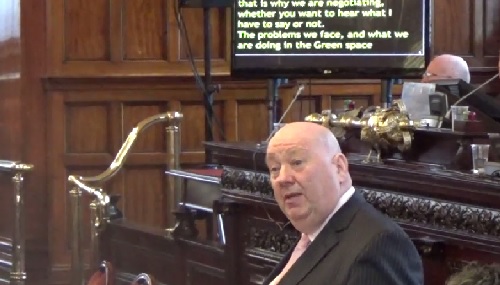Mayor Joe Anderson “my good name [has been] dragged through the mud” over £90,000 legal bill for unfair dismissal case
Please accept YouTube cookies to play this video. By accepting you will be accessing content from YouTube, a service provided by an external third party.
If you accept this notice, your choice will be saved and the page will refresh.
Liverpool City Council meeting of 16th September 2015 Part 1 of 6

After pledging his full support to the Royal National Institute for the Blind for the Council motion on the “Who Put That There!” campaign, Mayor Joe Anderson used his slot on the Council meeting agenda to give a very detailed explanation to those present about his former employer unfairly dismissing him.
“Joe must go” was a slogan on a protest banner I saw earlier this year, but this story starts with Chesterfield High School. Chesterfield High School told Joe to go, but Joe said no.
Joe (being a staunch trade unionist) felt this wasn’t fair. As His Honour Judge Serota QC put it Joe Anderson was on “a reverse form for a zero hours contract” in that he got to be Mayor, do zero hours of work for his employer yet still be paid by his employer!
However it wasn’t the fact that he was being paid for not working that was Joe’s problem. His employer decided that paying somebody for no work wasn’t “value for money” and that the public would be horrified if they knew so sent Joe a P45 through the post.
This hurt Joe. So Joe asked his friends at Liverpool City Council what they could do.
Sure enough Liverpool City Council got a lawyer for Joe. So it went to an Employment Tribunal.
The Employment Tribunal ruled that yes Joe had been unfairly dismissed but even if he hadn’t been, his employer would have still have sacked him anyway. So no compensation for Joe.
This was not the result Joe wanted, so once again he asked his friends at Liverpool City Council what they could do.
Sure enough Liverpool City Council got a lawyer (again) for Joe. So it went to an Employment Appeals Tribunal and here is the judgement.
Once again the case was lost and the final bill (that fell on the taxpayer) came to just under £90,000.
Mayor Anderson at the Liverpool City Council public meeting on the 16th September gave a detailed defence as to why he had done this.
Called to speak by the other Mayor, having been already embroiled in a trial by media, this was Mayor Anderson’s chance to have his say.
With his head bowed down, the normally confident Mayor seemed crestfallen. He started by referring to the blog of the Lib Dem Leader Cllr Richard Kemp. Mayor Anderson said he was doing this not because of Cllr Kemp’s blog.
He referred to it as “the Council’s legal action” (although as you can read from the Employment Appeals Tribunal judgement Liverpool City Council were not a party to the case).
Mayor Anderson was going to tell people the “full facts” and so that the public could “understand the complexities of this” followed by “I’ve certainly got nothing to hide or wish to disclose, err not disclose” .
Feeling his own collar he explained how he’d been on the radio that very day and dealing with the press detailling with the reasons why.
Joe (because it’s very hard in reporting this to know which bit it in this is Joe the former employee and which bit is Mayor Joe Anderson) said, “When I then became Leader of the Council in 2010, people in the Labour Party certainly know but I made a pledge, a promise that I would become a full-time Leader of the Council and for too long this Council was run like a toy town at Council and officers led the Council by the nose. Councillors weren’t here and decisions were made that were quite frankly not good enough for a Council and a city like Liverpool.”
Joe’s explanation was that when he was Leader of the Opposition on Liverpool City Council that Sefton Council had paid the LEA controlled Chesterfield School “round about £7,000 a year”. That was to pay Joe the 208 hours he was allowed off.
He claimed this cost Chesterfield School “less than £4,000” (although I’ll point out that surely Chesterfield would’ve had to pay both Joe time off to be a councillor and someone else to do his job?) which Joe saw as a “good deal”. Mayor Anderson stated that politicians were all doing this including two former leaders of Liverpool City Council.
Mayor Anderson claimed that the money he was receiving for no work from Chesterfield School he was giving to charity.
The difference however, came when Cllr Anderson became Mayor Anderson. He explained “six or seven weeks before my 55th birthday, Chesterfield High School became an academy and six or seven week before my 55th birthday sacked me without any discussion with me, without any negotiation with me” or as he put it “P45 in the post, you’re sacked”.
For him the fundamental principle as a trade unionist, he would support any councillor of whatever colour political party they may be, as the principle of being sacked for carrying out public service should be something that (saying this while twirling his finger) “we all defend and stand by”.
He said that the decision that that it should be challenged and that the indemnity policy applied was taken by the Chief Executive and Monitoring Officer of Liverpool City Council and that the Council’s external auditor and legal advisors were also informed.
In criticism of Councillor Kemp he said, “Let me ask ourselves the question around the politics of this, where it’s getting played out and how it’s disgracefully being played out. Course Councillor Kemp says, ‘Will he pay it back?'” At this point Mayor Anderson just shrugged in reply and then pointed out that former Lib Dem Leaders of Liverpool City Council had had similar arrangements with their employers.
He referred to the trial of former Lib Dem Leader of Liverpool City Council Warren Bradley, that a court had found guilty of perjury followed by saying “I’ve done nothing wrong, I’ve done absolutely nothing wrong. The only thing I’ve done wrong, the only thing I’ve done wrong is trusted the School to honour that procedure that we’ve got in place that was costing them nothing but because it went to an academy they decided to sack me. That was the only thing that we did wrong”.
Mayor Anderson continued, “Then you ask yourself the question, ‘Has Councillor Anderson benefitted from this, has he gained from this?’ Well let me tell ye, not only have I not gained, my good name which I am proud of and the hard work that I do for this City has been sullied by individuals in this Council, dragged through the mud by individuals in this Council, for doing nothing more than trying to serve the people of this City.
It’s been estimated that because I’ve been finished in my local government pension that I had for 16 years that I will have lost somewhere estimated to be £134,000 in contributions. If I die now in service or whatever, I’m not in service of course because I’m not in the pension, my wife, my family I get nothing, no protection! No job to go back to! And yet there are councillors in this chamber that want to pay politics with that.”
He said he would support anyone who was sacked for doing public service “because it’s the right thing to do public service and so my conscience on this matter is absolutely 110% clear” because “nothing I’ve done in this matter was for Joe Anderson. Nothing! ” and “never at any time did I seek any personal gain for me”.
Referring to the opposition Mayor Anderson said, “they played dirty politics with it and that shows to me, that shows to me the contempt that they have for the democratic politics that we engaged in over the Mayoral Deal and also the disrespect that they have for this City and for us and the form of governance that we’ve got.”
Mayor Anderson said that the government has accepted and will change through legislation the changes that need to be made to support mayors in the future. If he’d stayed as Leader of Liverpool City Council, he would’ve retained his salary, retained his allowances and retained his pension.
However the City of Liverpool wouldn’t have had the Mayoral Deal, the schools and wouldn’t have had that investment and he wouldn’t have lost out on his pension accruing and the benefits if he was still part of the pension scheme. He finished by saying, “My conscience on this matter is absolutely clear” and received a standing ovation and applause from his Labour councillors.
There are a series of FOI requests to Liverpool City Council on the whatdotheyknow website here, here and here that give further information on this matter.
If you click on any of the buttons below, you’ll be doing me a favour by sharing this article with other people.




